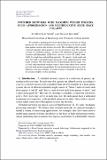Switched networks with maximum weight policies: Fluid approximation and multiplicative state space collapse
Author(s)
Shah, Devavrat; Wischik, Damon
DownloadShah-2012-Switched networks with maxim.pdf (526.3Kb)
PUBLISHER_POLICY
Publisher Policy
Article is made available in accordance with the publisher's policy and may be subject to US copyright law. Please refer to the publisher's site for terms of use.
Terms of use
Metadata
Show full item recordAbstract
We consider a queueing network in which there are constraints on which queues may be served simultaneously; such networks may be used to model input-queued switches and wireless networks. The scheduling policy for such a network specifies which queues to serve at any point in time. We consider a family of scheduling policies, related to the maximum-weight policy of Tassiulas and Ephremides [IEEE Trans. Automat. Control 37 (1992) 1936–1948], for single-hop and multihop networks. We specify a fluid model and show that fluid-scaled performance processes can be approximated by fluid model solutions. We study the behavior of fluid model solutions under critical load, and characterize invariant states as those states which solve a certain network-wide optimization problem. We use fluid model results to prove multiplicative state space collapse. A notable feature of our results is that they do not assume complete resource pooling.
Date issued
2012Department
Massachusetts Institute of Technology. Department of Electrical Engineering and Computer ScienceJournal
Annals of Applied Probability
Publisher
Institute of Mathematical Statistics
Citation
Shah, Devavrat, and Damon Wischik. “Switched Networks with Maximum Weight Policies: Fluid Approximation and Multiplicative State Space Collapse.” The Annals of Applied Probability 22.1 (2012): 70–127. 2012 © Institute of Mathematical Statistics
Version: Final published version
ISSN
1050-5164